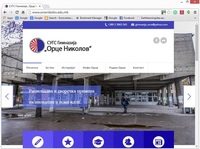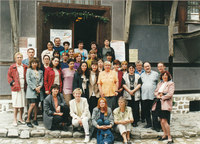Macedonia
Countries :: Macedonia
http://www.teacherweb.com/fm/qsiskopje/elena/
NAME: Elena Sentevska
SCHOOL: Quality Schools International, Skopje, Macedonia
CLASS: The best one
SCHOOL PHONE: Work: (+389 2) 3067 678 or 3091 669, Home: (+389 2) 3223 885, Cell: (+389 70) 842 783, Fax: (+389 2) 3062 250.
About The Teacher
EDUCATION
2001 - 2003 Framingham State College, Massachusetts, Master's Degree in International Education 1996-2000 University St. Cyril and Methoduis, Skopje, Macedonia, Bachelor's Degree (major: journalism)
AWARDS
1996: Bill Clinton's Presidential Award for outstanding academic achievements; Award on the Spanish language competition in the State of Ohio; Award for merit from the educational board of the State of Ohio; Recognition for an essay on the U.S. Constitution; Recognition from the American Association of International Student Exchange; Publication award from the daily newspaper "The Jeffersonian" 1991: Award on the 12th state competition of children's poetry in Ohrid; recognitions for successful participation in the regional math competitions in two consecutive years. 1990: First place on the city public drawing contest and a state award for a literature composition
PRESENTATIONS * Integrating Language Into Theme Based Teaching, ELTAM International Conference, Ohrid, Macedonia, 16 October 2004 * If You Give a Mouse a Cookie, Drama Summer School, Ohrid, Macedonia, 01 July 2004 * Assessment, Evaluation and Testing, Seminar for Young Teachers, University Koco Racin, Skopje, Macedonia, 27 March 2004 * Ways of Developing After Graduation, IATEFL-East Regional Conference, Zagreb's University, Zagreb, Croatia, 26 September 2003. * Nurturing the Genius in Each Child, IATEFL-BETA Regional Conference, South- Eastern University, Blagoevgrad, Bulgaria, 10 May 2003.
PUBLISHED ARTICLES o Possibilities of Technology Enhancement in ESL Classrooms - A Never Ending List - ELTAM (English Language Teachers' Association of Macedonia) Newsletter, Issue 7, January 2004. o Standards for Foreign Language Teaching, ELTAM (English Language Teachers' Association of Macedonia) Newsletter, Issue 5, April 2003.
INVOLVEMENT IN CURRENT PROJECTS o MADCAP (Macedonian Drama and Creative Arts Project) - one of the organizers of the first national drama festival in English, held in December 2003. o CLIL (Content and Language Integrated Learning) - Macedonian representative in this joint project with the British Council Bulgaria. o MACTEST (Macedonian Tests) - designer of tests which measure Macedonian language skills for expatriates who live and work in Macedonia.
Mission For The Class My mission while touching my students' lives forever is their optimal development as creative, knowledgeable, skillful persons who possess a positive image of themselves as individuals and members of the global modern society. I try to give to these young people the opportunity to develop and maintain their highest potential intellectually, creatively, socially and emotionally.
I believe in the collaborative educational approach where both teachers and children are active in structuring the inquiry, with educators having responsibility for guiding the process and children learning to participate in the management of their continuing education. With the certainty of the industrial age being replaced by the uncertainty of the information era, schools are challenged to prepare students to develop independence, self-confidence, self-reliance and a positive view of life and learning. And that can be mainly achieved in an environment that is stimulating, secure and full with collaborative and cooperative human relationships. I vision my classrooms as learning centers filled with creative energy, rich experiences, many achievements, challenging projects and life-lasting friendships.
I commit my strength in providing students with the ability to reason and think independently, analyze information critically and communicate effectively. Such cultivating development engenders self- directed learning, quality work, and the capacity to transfer knowledge across different areas while exchanging and expressing ideas in a variety of forms. Effective communication is also crucial in development of personal qualities that lead to acceptable values and harmonious relationships. I encourage my students to be open-minded and curious. I also strive to achieve their appreciation of the interdependence of people as well as the environment and to promote an awareness and understanding of the limited natural resources with the need for conservation.
I believe, besides teaching curriculum, in encouraging increased use of technology in order to prepare each child for successful entrance into the competitive economy world. Technological literacy will help students adapt and effectively fulfill their personal goals as well as promptly respond to the demands of the information age, seeing the world as a "global village". This concept is directly tied with multicultural awareness as a source of world's strength and the only way to preserve the democratic values for a peaceful life with tolerance and respect. These understandings help students develop open attitude about all people as well as a sense of personal worth and dignity.
I believe that each person in the universe is a unique individual with some features that make him/her more special than the rest of us. I try to locate these talents in each of my students and make them stronger. When I complete my task successfully, I know that students carry a piece of my personality until the rest of their lives. It is a two way process. They all leave their own special unique prints in my heart as well.
Report on training teachers for CLIL in Macedonia
Skopje 15 – 21 August 2006
Trainer: Stefka Kitanova
The training took place in the Gimnazia Orce Nikolov, teachers of Maths, Chemistry, Biology, Physics, History and Geography were trained.
The seminar began with short ‘CLIL’ ice breaking in order to get information on their level of language according to CEFL (identified B1 – B2).
During the first two days and a half teachers were introduced to CLIL as methodology and a relatively innovative approach for teaching subjects in FL – in our case English. The input was in the field how to help students with language in lessons of subject to develop their skills – reading, listening, writing and speaking. This input was realised showing them different techniques and pointing out specific language issues to be stressed while teaching subject in English. I tried to give as much as possible within the time we had.
One of the sessions was dedicated to assessment and evaluation of both language and subject knowledge in order teachers to understand the idea of what, when and how to assess and evaluate.
Some European projects in the field of CLIL were presented in a separate session in order to up-to-date them and introduce the new policies in the field.
After giving some ideas and examples about planning the content and language part of the lessons teachers started practical work on planning the first 10 pedagogical units (nastavni edinici) of their future work with my support. The main problem of lack of appropriate (in some cases any) materials in English appeared immediately. The group did its best to deal with the problem but I see this as the main obstacle – they really need materials.
When the first units were ready teachers started to ‘present’ what they had prepared. After the first (most stressful) presentations they were asked to share opinions according to the observation sheet given in the Assessment session. Then the ‘presentations’ followed in better way and during the last ones teachers were better confident in what they are doing after 1 September.
Feed back: during the last session teachers were asked to write on the flipchart their positive (+) and negative (-) feelings about the workshop as well as they were invited to share any comments they have on it.
Positive
Stefka – great master of her profession
Stefka I like the way you teach us
Nice T-shirts
Big challenge
Lot of learn
Starting thinking in English
I understood everything from the teacher
I like when you are very ‘bad’ with us
Starting teach in different way
Wonderful teacher
Negative
Very short seminar
We need more lessons
Need computer
Out of electricity
Internet
I need many materials
Real frightful challenge
Other comments
No materials
Much information for short time
It is very warm/hot
I am sleepy today
No electricity- no atmosphere
Teachers shirt excellent
Sorry I did not go out with you and missed the fun
Having fun with nice company
Stefka is very strict teacher
Stefka is a dynamic person that can give me more and more
Thanks!
This is what teachers wrote. If you need any explanation – Let me know.
Yours
Stefka
Stefka Kitanova
POB 57, Sofia 1797, Bulgaria
+359/2/962 04 42
+359/898/48 96 99
Content and language teaching in the Republic of Macedonia
In primary schools pupils learn basics of the foreign language (English, German, French or Russian) from Vth - VIIIth grade.
In the Republic of Macedonia there are 90 state secondary schools and 3 private secondary schools.
- In the state sector:
- In all secondary schools students study one or two foreign languages on higher level.
- Earlier some specific subjects were studied in the English language in two secondary schools. This project lasted until last year because it needed much more finance then classical education.
- At French Cultural Center’s initiative in 7 secondary schools in the Republic of Macedonia students study natural sciences in French language. French Embassy in the Republic of Macedonia financially supports this project.
- In the private sector:
- In two secondary schools students study in Macedonian and English language
- In the 3rd one besides Macedonian and English students also study in Turkish language (although Turkish is minority language in the Republic of Macedonia and in this case it is considered as a foreign language).
At university level:
- At Faculty of Philology where foreign languages are studied all subjects are studied in particular foreign language. Here also students are trained for teaching foreign languages in the primary and secondary schools.
- At all Faculties one or two foreign languages are studied mostly during the first two years. These courses are orientated on specific terminology depending on the appropriate Faculty.
There are some additional projects held in foreign languages:
- Junior Achievement - Business and Economics
- Cisco CCNA Training - starting this year (distance learning).
Elena Mladenovska
Maths Teacher
elenko@hotvoice.com


